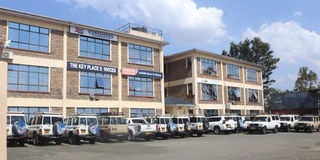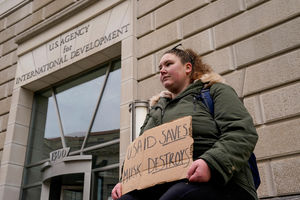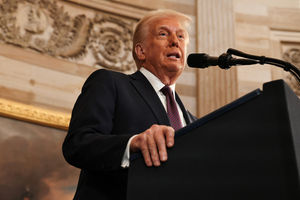
Vehicles parked at Liverpool and Path offices in Homa Bay Town on February 4, 2025. Staff from the two non-governmental organisations which get support from USAID were asked not to report to work after the American government withdrew its support.
Before February 1, 2025, more than 20 vehicles would leave Liverpool VCT (LVCT)-Kenya offices in Homa Bay County to ferry workers to various hospitals scattered across the county to offer HIV services.
LVCT Kenya has been actively supporting HIV intervention and prevention programmes in Homa Bay, including hiring workers to conduct voluntary HIV testing and offering counselling services to residents.
The NGO that provides health services also runs other programmes which aim to reduce the HIV and Aids prevalence in the county.
Usually, the members of staff are moved around in vehicles, but the presence of the land cruisers on dusty Homa Bay roads has since dwindled following the suspension of foreign aid by US President Donald Trump.
The building that housed the LVCT health office in Homa Bay, a beehive of activity until recently, has suddenly gone silent after several projects were suspended.
Up to 20 vehicles which previously aided in the coordination of health programmes have been grounded at the organisation’s office located at Junction Kodoyo, along the Homa Bay-Rongo road with no sign that they will be back on the road again.
Just a handful of workers have been reporting to the office, not to work, but to check if there has been fresh communication regarding their fate.
LVCT Health receives its financial support from USAID and since the directive by President Trump, the organisation suspended all its activities in Homa Bay.
Other organisations adversely affected by the directive include Path, which also operates from the same building as LVCT Health. Staff at the organisation have equally been asked to stay home.
Homa Bay Health Chief Officer Kevin Osuri recently wrote a memo asking all the staff working in public hospitals but drawing salaries from USAID to stop going to work.
In the January 31 memo copied to Governor Gladys Wanga and the county public service board, Dr Osuri said that the county government had received communication from its partners, mainly LVCT Health, USAID and CDC, directing its staff to stop going to work.
“As you are in no doubt aware, the affected programmes operated under specific agreements with the bottom line that the US Government offered funding. In view of the executive order that has stopped the funding and the stop work directive, and upon taking legal advice, the county government is obligated to enforce the stop work directive with immediate effect, as we hereby do,” the memo reads in part.
Dr Osuri continued “All affected staff are directed to hand over to the in-charge, and where the in-charge is affected, to the administrator.”
He said the county government was monitoring the situation and would update affected groups if there are any subsequent developments.
“We shall keep you all posted. In the meantime, we take the opportunity to express gratitude to our partners and staff for the good work we have done over the years,” the health chief officer wrote.
Withdrawal of LVCT staff has affected services in a number of hospitals in Homa Bay.
At the county teaching and referral hospital, booths that were designated for HIV testing and counseling services remained closed.
HIV testing is currently offered largely to special groups of people such as expectant women at the prenatal clinic.
Viral-load testing, where samples would be collected from remote health facilities and taken for examination at the referral hospital, have also been affected.
Dr Osuri said USAID supported the programme by funding a team that moved around using motorcycles to collect samples from hospitals and deliver results to the same health facilities.
The programmes that have been worst hit include USAID Nuru Ya Mtoto Project that supports HIV and Aids response by safeguarding the rights and welfare of children and adolescents impacted by the viral disease. It was funded through the US President's Emergency Plan for AIDS Relief (Pefpar).
LVCT Vukisha 95, which is another project under USAID, works to support the implementation and expansion of comprehensive HIV prevention, care and treatment.
The project supplement’s the government’s HIV and Aids response by providing and scaling up services for orphans and vulnerable children together with adolescent girls and young women through the Determined, Resilient, Empowered, AIDS-free, Mentored and Safe (Dreams) project.
The initiative works to reduce HIV infection among adolescent girls and young women.
Dr Osuri said other “smaller” (sub-recipients) organisations have equally been affected and have withdrawn their services.
They include organisations that support children welfare such as fighting teenage pregnancies.
He said Homa Bay has been greatly affected, especially in the fight against HIV and other opportunistic diseases like TB.
County-run health facilities in Homa Bay used to get a lot of technical support from NGO-paid workers.
They included clinical officers, nurses among other health workers who in most cases would stand in gap when the county employees down their tools over salary delays.
“They were supporting us in areas such as digital medical records and so many other fronts. We have since stopped all those partner-supported staff from working,” Dr Osuri said.
Dr Osuri said that as a stop-gap measure, the county government has started implementing a contingency plan aimed at saving patients from early death. The strategy includes integrating services in public hospitals.
In the past, HIV patients would get preferential treatment and would be attended to from patient support centres created within the health facilities for privacy purposes.
The chief officer revealed that such an arrangement would no longer be possible and that people living with HIV the will now be seeking services together with other patients at the outpatient unit, laboratory and at the pharmacy.
Dr Osuri said the county government was receiving support from Médecins Sans Frontières (Doctors without borders) whose funding comes from France.
MSF however has centred its operations in Homa Bay and Ndhiwa sub-counties and is focused on reducing non-communicable diseases like asthma, tuberculosis, hypertension and epilepsy.
Dr Osuri said that disruption of HIV services should not cause any alarm. He said Homa Bay had received three months’ supply of Antiretroviral drugs which will be given out to HIV patients.
“We have begun filling the gap left by staff from the affected NGOs,” the health chief officer said.










